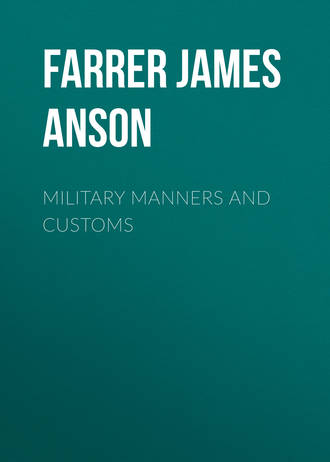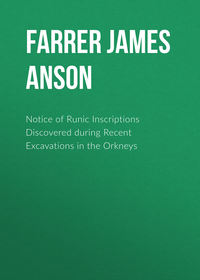
Military Manners and Customs
This remarkable fact is certified by Mr. Russell, in his Diary in the last Great War, 398, 399.
17
Cicero, In Verrem, iv. 54.
18
See even the Annual Register, lvi. 184, for a denunciation of this proceeding.
19
Sismondi’s Hist. des Français, xxv.
20
Edwards’s Germans in France, 171.
21
Lieut-Col. Charras, La Campagne de 1815, i. 211, ii. 88.
22
Woolsey’s International Law, p. 223.
23
Cf. lib. xii. 81, and xiii. 25, 26; quoted by Grotius, iii. xi. xiii.
24
iii. 41.
25
Cambridge Essays, 1855, ‘Limitations to Severity in War,’ by C. Buxton.
26
See Raumer’s Geschichte Europa’s, iii. 509-603, if any doubt is felt about the fact.
27
General Order of October 9, 1813. Compare those of May 29, 1809, March 25, 1810, June 10, 1812, and July 9, 1813.
28
Vattel, iii. ix. 165.
29
Sir W. Napier (Peninsular War, ii. 322) says of the proceeding that it was ‘politic indeed, yet scarcely to be admitted within the pale of civilised warfare.’ It occurred in May 1810.
30
Bluntschli’s Modernes Völkerrecht, art. 573.
31
For the character of modern war see the account of the Franco-German war in the Quarterly Review for April 1871.
32
Halleck, ii. 22.
33
Vehse’s Austria, i. 369. Yet, as usual on such occasions, the excesses were committed in the teeth of Tilly’s efforts to oppose them.
‘Imperavit Tillius a devictorum cædibus et corporum castimonia abstinerent, quod imperium a quibusdam furentibus male servatum annales aliqui fuere conquesti.’ – Adlzreiter’s Annales Boicæ Gentis, Part iii. l. 16, c. 38.
34
Battles in the Peninsular War, 181, 182.
35
Ibid. 396.
36
Foxe’s Actes and Monuments, iii. 52.
37
Saint-Palaye, Mémoires sur la Chevalerie, iii. 10, 133.
38
Vinsauf’s Itinerary of Richard I., ii. 16.
39
Matthew of Westminster, 460; Grose, ii. 348.
40
Monstrelet, ii. 115.
41
Mémoires sur la Chevalerie, i. 322.
42
Petitot, v. 102; and Ménard, Vie de B. du Guesclin, 440.
43
Petitot, v. 134.
44
Meyrick, Ancient Armour, ii. 5.
45
i. 123.
46
Monstrelet, i. 259.
47
ii. 5.
48
ii. 11.
49
ii. 22, compare ii. 56.
50
Monstrelet, ii. 111.
51
ii. 113.
52
See for some, Livy, xxix. 8, xxxi. 26, 30, xxxvii. 21, xliii. 7, xliv. 29.
53
Livy, xliv. 29.
54
Meyrick, i. 41.
55
Demmin, Encyclopédie d’Armurerie, 490.
56
Meyrick, ii. 204.
57
Grose, ii. 114.
58
Petitot, xvi. 134.
59
Grose, ii. 343.
60
iv. 27.
61
iv. 36.
62
iii. 109.
63
Mémoires, vi. 1.
64
Halleck, International Law, ii. 154.
65
Elements of Morality, sec. 1068.
66
Des Droits et Devoirs des Nations neutres, ii. 321-323.
67
History of the Royal Navy, i. 357.
68
Monstrelet, i. 12.
69
Nicolas, ii. 108.
70
Ibid. i. 333.
71
Froissart, ii. 85.
72
Entick, New Naval History (1757), 823. ‘Some of the Spanish prizes were immensely rich, a great many of the French were of considerable value, and so were many of the English; but the balance was about two millions in favour of the latter.’
73
From Entick’s New Naval History (1757), 801-817.
74
Martens, Essai sur les Corsaires (Horne’s translation), 86, 87.
75
Ibid. 93.
76
III. xv. 229.
77
Emerigon, On Insurances (translation), 442.
78
Martens, 19.
79
Hautfeuille, Des Droits et Devoirs des Nations neutres, ii. 349.
80
De Jure Maritimo, i. 72.
81
Despatches, vi. 145.
82
Despatches, vi. 79.
83
The last occasion was on April 13, 1875.
84
Halleck, International Law, ii. 316.
85
Bluntschli, Modernes Völkerrecht, art. 665.
86
James, Naval History, i. 255.
87
James, ii. 71.
88
Ibid. ii. 77.
89
Ortolan, Diplomatie de la Mer, ii. 32.
90
Campbell’s Admirals, viii. 40.
91
Campbell, vii. 21. James, i. 161. Stinkpots are jars or shells charged with powder, grenades, &c.
92
James, i. 283.
93
Brenton, ii. 471.
94
Caltrops, or crows’-feet, are bits of iron with four spikes so arranged that however they fall one spike always remains upwards. Darius planted the ground with caltrops before Arbela.
95
Chapter xix. of the Tactica.
96
Frontinus, Strategematicon, IV. vii. 9, 10. ‘Amphoras pice et tæda plenas; … vascula viperis plena.’
97
Roger de Wendover, Chronica. ‘Calcem vivam, et in pulverem subtilem redactam, in altum projicientes, vento illam ferente, Francorum oculos excæcaverunt.’
98
Brenton, i. 635.
99
De Jure Maritimo, i. 265.
100
Rees’s Cyclopædia, ‘Fire-ship.’
101
Brenton, ii. 493, 494.
102
Halleck, ii. 317.
103
Woolsey, International Law, 187.
104
James, i. 277.
105
Phillimore, International Law, iii. 50-52.
106
International Law, ii. 95.
107
Villiaumé, L’Esprit de la Guerre, 56.
108
De Commines, viii. 8.
109
Watson’s Philip II., ii. 74.
110
Ibid. i. 213.
111
Memoirs, c. 19.
112
Villiaumé (L’Esprit de la Guerre, 71) gives the following version: ‘En 1793 et en 1794, le gouvernement anglais ayant violé le droit des gens contre la République Française, la Convention, dans un accès de brutale colère, décréta qu’il ne serait plus fait aucun prisonnier anglais ou hanovrien, c’est-à-dire que les vaincus seraient mis à mort, encore qu’ils se rendissent. Mais ce décret fut simplement comminatoire; le Comité de Salut Public, sachant très-bien que de misérables soldats n’étaient point coupables, donna l’ordre secret de faire grâce à tous les vaincus.’
113
Herodotus, vii. 136.
114
Livy, xlv. 42.
115
Ibid. xlv. 43.
116
Ward, Law of Nations, i. 250.
117
Petitot’s Mémoires, xvi. 177.
118
Livy, xlii. 8, 9.
119
Monstrelet, Chronicles, i. 200.
120
Ibid. i. 224.
121
Ibid. i. 249.
122
Ibid. i. 259.
123
Monstrelet, ii. 156.
124
Ibid. 120.
125
Philip de Commines, ii. 1.
126
Ibid. ii. 2.
127
Ibid. ii. 14.
128
Philip de Commines, iii. 9.
129
Motley’s United Netherlands, iii. 323.
130
Vattel, iii. 8, 143.
131
Borbstaedt, Franco-German War (translation), 662.
132
Ward, i. 223.
133
Quintus Curtius, iv. 6, and Grote, viii. 368.
134
Quintus Curtius, vii. 11.
135
Ibid. iv. 15.
136
Arrian, iii. 18.
137
Quintus Curtius, vii. 5.
138
‘Tous deux furent très braves, très vaillants, fort bizarres et cruels.’
139
Lyttleton, Henry II., i. 183.
140
Hoveden, 697.
141
2 Samuel xii. 31.
142
Memoirs of a Cavalier, i. 47.
143
Memoirs of a Cavalier, 49.
144
‘Life of Bayard’ in Petitot’s Mémoires, xvi. 9.
145
Major-General Mitchell’s Biographies of Eminent Soldiers, 92.
146
Livy, xxxi. 40. When Pelium was taken by storm, only the slaves were taken as spoil; the freemen were even let off without ransom.
147
Ibid. xxviii. 3.
148
Ibid. xxviii. 20, xxvii. 16, xxxi. 27.
149
De Officiis, i. 12. Yet on this passage is founded the common assertion that among the Romans ‘the word which signified stranger was the same with that which in its original denoted an enemy’ (Ward, ii. 174); implying that in their eyes a stranger and an enemy were one and the same thing. Cicero says exactly the reverse.
150
Recueil de Documents sur les exactions, vols, et cruautés des armées prussiennes en France. The book is out of print, but may be seen at the British Museum, under the title, ‘Prussia – Army of.’ It is to be regretted that, whilst every book, however dull, relating to that war has been translated into English, this record has hitherto escaped the publicity it so well deserves.
151
Ibid. 19.
152
Ibid. 8.
153
Ibid. 13.
154
Chaudordy’s Circular of November 29, 1870, in the Recueil.
155
Recueil, 12, 15, 67, 119.
156
Ibid. 56.
157
Ibid. 54.
158
Recueil, 33-37, and Lady Bloomfield’s Reminiscences, ii. 235, 8, 9.
159
The Times, March 7, 1881.
160
Recueil, 29; compare 91.
161
Morley’s Cobden, ii. 177.
162
Professor Sheldon Amos quotes the fact, but refrains from naming the paper, in his preface to Manning’s Commentaries on the Law of Nations, xl. Was it not the Journal de France for Nov. 21, 1871?
163
iii. i. viii. 4.
164
De Officiis, i. 13.
165
Modernes Völkerrecht, Art. 565.
166
Polyænus, Strategematum libri octo, i. 34.
167
Polyænus, v. 41.
168
Ortolan’s Diplomatie de la mer, ii. 31, 375-7.
169
James’s Naval History, ii. 211; Campbell’s Admirals, vii. 132.
170
James, Naval History, ii. 225.
171
Nicolas, Royal Navy, ii. 27.
172
Hautefeuille, Droit Maritime, iii. 433. ‘Les vaisseaux de l’Etat eux-mêmes ne rougissent pas de ces grossiers mensonges qui prennent le nom de ruses de guerre.’
173
xiii. 1.
174
Montaigne, ch. v.
175
vii. 4. ‘Quia appellatione nostra vix apte exprimi possunt, Græca pronuntiatione Stratagemata dicuntur.’
176
Livy, xlii. 47.
177
Histoire de la France, iii. 401.
178
The word musket is from muschetto, a kind of hawk, implying that its attack was equally destructive and unforeseen.
179
Polyænus, ii. 19.
180
Polyænus, iii. 2; from Thucydides, iii. 34.
181
Ibid. vii. 27, 2.
182
Ibid. iv. 2-4.
183
Liskenne, Bibliothèque Historique et Militaire, iii. 845.
184
Memoirs, ch. xix.
185
ix. 6, 3.
186
vi. 22.
187
vi. 15.
188
iv. 7, 17.
189
E. Fournier, L’Esprit dans l’Histoire, 145-150.
190
iii. 10.
191
Liskenne, v. 233-4.
192
Soldier’s Pocket-Book, 81.
193
Polyænus, viii. 16, 8. ‘Lege Romanorum jubente hostium exploratores interficere.’
194
Livy, xxx. 29. According to Polyænus, he gave them a dinner and sent them back with instructions to tell what they had seen; viii. 16, 8.
195
Watson’s Philip II. iii. 311.
196
Liskenne, iii. 840.
197
Hoffman, Kriegslist, 15.
198
Petitot’s Mémoires de la France, xv. 317.
199
Polyænus, ii. 27.
200
Ibid. v. 1, 4.
201
Memoirs, ch. xix.
202
Livy, xxxiv. 17.
203
As at the Brussels Conference, 1874, when such a proposal was made by the member for Sweden and Norway.
204
In Pinkerton, xvi. 817.
205
Turner’s Nineteen Years in Samoa, 304.
206
Schoolcraft’s Indian Tribes, iv. 52.
207
The Basutos, 223.
208
Potter’s Grecian Antiquities, ii. 69.
209
Turner’s Samoa, 298.
210
Ellis’s Polynesian Researches, i. 275.
211
Hutton’s Voyage to Africa, 1821, 337.
212
Colenso and Durnford’s Zulu War, 364, 379.
213
Petitot’s Mémoires, xv. 329.
214
The evidence is collected in Cetschwayo’s Dutchman, 99-103.
215
Henty’s March to Coomassie, 443. Compare Reade’s Ashantee Campaign, 241-2.
216
Florus, ii. 19; iii. 4; Velleius Paterculus, ii. 1.
217
Florus, ii. 20.
218
Ibid. iii. 7.
219
Florus, iii. 4; Cæsar, De Bello Gallico, ix. 44.
220
Morley’s Cobden, ii. 355.
221
Sir A. Helps’ Las Casas, 29.
222
T. Morton’s New England Canaan, 1637, iii.
223
Belknap’s New Hampshire, i. 262.
224
Penhallow’s Indian Wars, 1826, republished 1859, 31-3.
225
Ibid. 105, 6.
226
Ibid. 103. For further details of this debased military practice, see Adair’s History of American Indians, 245; Kercheval’s History of the Valley of Virginia, 263; Drake’s Biography and History of the Indians, 210, 373; Sullivan’s History of Maine, 251.
227
Kercheval’s Virginia, 113.
228
Eschwege’s Brazil, i. 186; Tschudi’s Reisen durch Südamerika, i. 262.
229
Parkman’s Expedition against Ohio Indians, 1764, 117.
230
Argensola, Les Isles Molucques, i. 60.
231
Drake’s Biography and History of the Indians, 489, 490.
232
R. C. Burton’s City of the Saints, 576; Eyre’s Central Australia, i. 175-9.
233
Borwick’s Last of the Tasmanians, 58.
234
Tschudi’s Reisen, ii. 262.
235
Maccoy’s Baptist Indian Missions, 441; Froebel’s Seven Years in Central America, 272; Wallace’s Travels on the Amazon, 326.
236
Bancroft’s United States, ii. 383-5; and compare Clarkson’s Life of Penn, chaps. 45 and 46.
237
Brooke’s Ten Years in Sarawak, i. 74.
238
Captain Hamilton’s East Indies, in Pinkerton, viii. 514.
239
W. H. Russell’s My Diary in India, 150.
240
Annals of the Propagation of the Faith, viii. 280-6.
241
Caffres and Caffre Missions, 210.
242
Memorials of Henrietta Robertson, 259, 308, 353.
243
Ibid. 353.
244
Colenso and Durnford’s Zulu War, 215.
245
Holden’s History of Natal, 210, 211.
246
Moister’s Africa, Past and Present, 310, 311.
247
Tams’s Visit to Portuguese Possessions, i. 181, ii. 28, 179.
248
Robertson’s America; Works, vi. 177, 205.
249
Thomson’s Great Missionaries, 30; Halkett’s Indians of North America, 247, 249, 256.
250
Le Blant, Inscriptions Chrétiennes, i. 86.
251
Bingham, Christian Antiquities, i. 486.
252
Cæsar, De Bello Gallico, vi. 14. ‘Druides a bello abesse consuerunt … militiæ vacationem habent;’ and Origen, In Celsum, viii. 73, for the Romans.
253
Vaughan’s Life of Wycliffe, ii. 212-3.
254
Turner’s England, iv. 458, from Duchesne, Gesta Stephani.
255
‘Non filius meus est vel ecclesiæ; ad regis autem voluntatem redimetur, quia potius Martis quam Christi miles judicatur.’
256
Turner’s England, v. 92.
257
‘Sanxit ut nullus in posterum sacerdos in hostem pergeret, nisi duo vel tres episcopi electione cæterorum propter benedictionem populique reconciliationem, et cum illis electi sacerdotes qui bene scirent populis pœnitentias dare, missas celebrare, etc.’ (in Du Cange, ‘Hostis’).
258
Guicciardini. ‘Prometteva che se i soldati procedevano virilmente, che non accetterebbe la Mirandola con alcuno patto: ma lascierebbe in potestà loro il saccheggiarla.’
259
Monstrelet, i. 9.
260
Crichton’s Scandinavia, i. 170.
261
Mémoires du Fleurange. Petitot, xvi. 253.
262
See Palmer, Origines Liturgicæ, ii. 362-65, for the form of service.
263
Petitot, xvi. 229.
264
Ibid. 135.
265
Petitot, viii. 55. ‘Feciono venire per tutto il campo un prete parato col corpo di Christo, e in luogo di communicarsi ciascuno prese uno poco di terra, e la si mise in boca.’
266
Livy, xxxvi. 2.
267
Robertson, Charles V., note 21. Ryan, History of Effects of Religion on Mankind, 124.
268
M. J, Schmidt, Histoire des Allemands traduite, etc., iv. 232, 3.
269
‘Christianis licet ex mandato magistratus arma portare et justa bella administrare.’
270
Policy of War a True Defence of Peace, 1543.
271
Pallas Armata, 369, 1683.
272
In his treatise Du droit de la guerre.
273
L’Esprit, i. 562.
274
Strafgesetzbuch, Jan. 20, 1872, 15, 75, 150.
275
Fleming’s Volkommene Teutsche Soldat, 96.
276
Benet’s United States Articles of War, 391.
277
Grose, ii. 199.
278
See Turner’s Pallas Armata, 349, for these and similar military tortures.
279
Crichton’s Scandinavia, i. 168.
280
Grose, ii. 6.
281
Sir S. Scott’s History of the British Army, ii. 436.
282
ii. 16. ‘Omnes autem signarii vel signiferi quamvis pedites loricas minores accipiebant, et galeas ad terrorem hostium ursinis pellibus tectas.’
283
Scott, ii. 9.
284
Scott, i. 311.
285
Said to have been invented about 400 B.C. by Dionysius, tyrant of Syracuse.
286
Mitchell’s Biographies of Eminent Soldiers, 208, 287.
287
Compare article 14 of the German Strafgesetzbuch of January 20, 1872.
288
Nineteenth Century, November 1882: ‘The Present State of the Army.’
289
De Re Militari, vi. 5.
290
Bruce’s Military Law (1717), 254.
291
See Fleming’s Teutsche Soldat, ch. 29.
292
See the War Articles for 1673, 1749, 1794.
293
82.
294
Quintus Curtius, viii. 2.
295
Military Law, 163.
296
286, 290.
297



